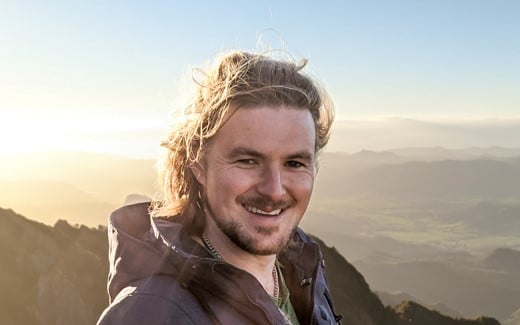Giving Back
He was the child whose mother feared he’d end up in prison. Now former SPELD NZ student Tadhg Norgrove is poised to become a clinical psychologist and help others who struggle with life. Here’s how he’s worked through 11 challenging years of study.
School was not Tadhg’s happy place; his learning difficulties resulted in emotional turmoil. But SPELD NZ tuition helped him find coping strategies and by the time he was at university, Tadhg hit his stride studying psychology

He’s just finished his master’s degree and is preparing to embark on a PhD in clinical psychology. Tadhg’s aim is to work as a clinical psychologist in Corrections Facilities, helping predominantly Māori populations. It’s an area he’s passionate about, but attaining the qualifications is no easy task.
“I do have ADHD and it is difficult,” he says. “But just because something is difficult that doesn’t mean I don’t want to do it.”
Tadhg acknowledges that he still has tendencies to be impulsive, get distracted and to fidget, but he’s found ways to navigate these issues. He’s built up what he describes as his own mental health toolkit. “It’s a prerequisite for me – especially in psychology because you’re exposed to a lot of traumatic incidents and it’s really important to be able to look after yourself.”
Tadhg stopped taking prescribed ADHD medication 10 years ago. He felt that it wasn’t working for him and he experienced adverse side effects. However, he’s supportive of those who use it and believes it comes down to what works for the individual.
Hard times makes us grow as people.
Exercise has played a major role in the success he has living with ADHD. “Maintaining my physical activity and doing the things I really enjoy is essential – even though they might be challenging. Some days that may be a lot and others it’s considerably less. For me, it’s about making small changes to produce lasting patterns.”
A fidget cube and a grip strengthener also help Tadhg keep calm and focused. Mindfulness is another key component of his mental health toolkit. “For me it’s about acknowledging when I have urges and just letting them sit there. I imagine it’s like a sea; if you have a wave that’s really intense but you allow the wave to relax, there’s no resistance – you don’t get as much power from it.”
Aside from his studies, Tadhg has also been working as a community facilitator delivering Acceptance and Commitment Therapy. “I absolutely love it!” he says. “It’s changed the way I interact with myself and others. I try to embrace life to the fullest and don’t run away from difficult and aversive thoughts and feelings.”
Tadhg says he really enjoys encouraging kids who are struggling with ADHD, reassuring them that their struggles are real and it’s OK. “Although ADHD can make things more difficult, it’s not a defining characteristic. But it’s important to have a realistic expectation around it.
“Life is like a road, and how we handle the bumps in the road define our character. Hard times make us grow as people. So, if we’re able to move forward through that suffering, whether it’s a challenge in our academic, personal, social or professional lives, these are things that will make us stronger and that we will be able to pass down to others.”
Our thanks to contributing writer Simon Herbst






